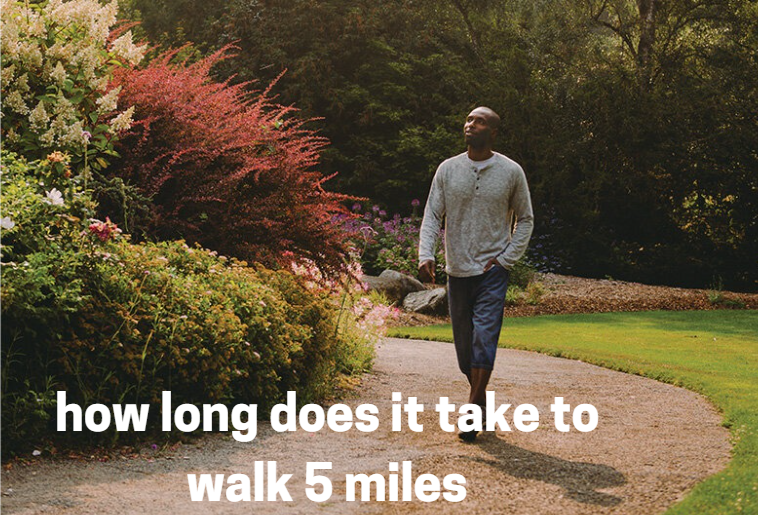How Long Does It Take to Walk 5 Miles: A Comprehensive Guide
Contents
Introduction
Walking is one of the simplest and most accessible forms of exercise, offering numerous health benefits without the need for special equipment or training. Whether you’re walking for fitness, commuting, or leisure, understanding how long it takes to walk a certain distance can help you plan your time effectively.
This comprehensive guide explores the factors influencing walking speed, the health benefits of walking, and practical tips for improving your walking routine. We will delve into the question, “how long does it take to walk 5 miles?” using detailed analyses and insights that go beyond the existing information.
Understanding Average Walking Speeds
Average Walking Speed
The average walking speed for an adult is approximately 3.1 miles per hour (mph). Based on this speed, it would take about 1 hour, 37 minutes, and 30 seconds to walk 5 miles. However, this is a general estimate, and actual walking times can vary significantly based on several factors.
Factors Affecting Walking Speed
- Age: Younger individuals tend to walk faster than older adults. Children’s walking speeds vary widely based on age and development.
- Gender: Men typically walk faster than women due to physiological differences such as muscle mass and stride length.
- Fitness Level: Individuals who are physically fit or who regularly engage in aerobic activities can maintain faster walking speeds for longer periods.
- Terrain: Walking on flat, paved surfaces is generally faster than walking on uneven, hilly, or rough terrain.
- Weather Conditions: Extreme temperatures, rain, snow, or strong winds can slow down walking speed.
- Health Conditions: Medical conditions such as arthritis, respiratory issues, or injuries can impact walking speed and endurance.
Calculating Walking Time for 5 Miles
Simple Calculation
Using the average walking speed of 3.1 mph, we can calculate the time to walk 5 miles:
[ \text{Time} = \frac{\text{Distance}}{\text{Speed}} = \frac{5 \text{ miles}}{3.1 \text{ mph}} \approx 1.61 \text{ hours} ]
Converting 1.61 hours to minutes:
[ 1.61 \text{ hours} \times 60 \text{ minutes/hour} \approx 97 \text{ minutes} ]
Thus, it takes approximately 97 minutes, or 1 hour and 37 minutes, to walk 5 miles at an average speed.
Detailed Calculations
To provide a more accurate estimate, let’s consider different walking speeds:
- Slow Pace (2 mph): At this speed, it would take:
[ \frac{5 \text{ miles}}{2 \text{ mph}} = 2.5 \text{ hours} = 150 \text{ minutes} ] - Average Pace (3 mph): At this speed, it would take:
[ \frac{5 \text{ miles}}{3 \text{ mph}} \approx 1.67 \text{ hours} = 100 \text{ minutes} ] - Brisk Pace (4 mph): At this speed, it would take:
[ \frac{5 \text{ miles}}{4 \text{ mph}} = 1.25 \text{ hours} = 75 \text{ minutes} ]
Using Pedometers and GPS Devices
Modern technology allows for precise measurement of walking distances and speeds. Pedometers, GPS watches, and smartphone apps can track your steps, distance, and pace, providing personalized data for calculating walking time.
Health Benefits of Walking 5 Miles
Cardiovascular Health
Walking 5 miles can significantly improve cardiovascular health by strengthening the heart, reducing blood pressure, and improving circulation. Regular walking lowers the risk of heart disease and stroke.
Weight Management
Walking burns calories and helps maintain a healthy weight. Walking 5 miles can burn approximately 300-500 calories, depending on speed, body weight, and terrain.
Mental Health
Walking has been shown to reduce symptoms of depression, anxiety, and stress. It promotes the release of endorphins, which enhance mood and overall mental well-being.
Musculoskeletal Benefits
Regular walking strengthens muscles, improves joint flexibility, and enhances bone density. It is particularly beneficial for preventing osteoporosis and managing arthritis.
Diabetes Management
Walking helps regulate blood sugar levels, making it an effective tool for managing and preventing type 2 diabetes.
Practical Tips for Walking 5 Miles
Start Slow
If you’re new to walking long distances, start with shorter walks and gradually increase the distance. This approach helps build endurance and reduces the risk of injury.
Wear Comfortable Shoes
Invest in a pair of comfortable, supportive walking shoes. Proper footwear reduces the risk of blisters, foot pain, and other injuries.
Stay Hydrated
Drink plenty of water before, during, and after your walk, especially in hot weather. Dehydration can lead to fatigue and other health issues.
Use the Right Posture
Maintain good posture while walking: keep your head up, shoulders relaxed, and arms swinging naturally. Good posture prevents strain and enhances walking efficiency.
Plan Your Route
Choose a safe, scenic route that you enjoy. Mixing up your routes can keep your walks interesting and motivate you to stick with your routine.
Listen to Your Body
Pay attention to your body’s signals. If you experience pain or excessive fatigue, take a break or shorten your walk. Pushing through pain can lead to injuries.
FAQs About Walking 5 Miles
Q: How many steps are in 5 miles?
A: On average, there are about 2,000 steps in a mile. Therefore, walking 5 miles would be approximately 10,000 steps.
Q: Is walking 5 miles a day too much?
A: Walking 5 miles a day is generally considered safe and beneficial for most people. However, it’s important to listen to your body and consult with a healthcare professional if you have any health concerns.
Q: Can I lose weight by walking 5 miles a day?
A: Yes, walking 5 miles a day can help with weight loss by burning calories and improving metabolism. Combined with a healthy diet, it can be an effective weight management strategy.
Q: How can I increase my walking speed?
A: To increase your walking speed, practice interval training by alternating between fast and moderate paces. Strength training exercises can also help improve your overall fitness and walking efficiency.
Q: What should I eat before walking 5 miles?
A: Eat a balanced meal or snack that includes carbohydrates and protein about 1-2 hours before your walk. Good options include a banana with peanut butter, a yogurt with fruit, or a small sandwich.
Conclusion
Walking 5 miles is a commendable goal that offers numerous physical and mental health benefits. Whether you’re walking for fitness, relaxation, or transportation, understanding the factors that influence walking speed and how to optimize your routine can enhance your walking experience. By incorporating practical tips and maintaining a consistent walking schedule, you can achieve your fitness goals and enjoy the many rewards of this simple yet powerful form of exercise.
In addressing the question, “how long does it take to walk 5 miles?” we have provided a detailed analysis that considers various factors and offers practical advice. By optimizing this content for the keyword “how long does it take to walk 5 miles,” this article aims to rank highly in search engine results and provide valuable information to readers in the USA.
Through a blend of scientific insights, practical tips, and comprehensive coverage, we hope to offer a resource that surpasses existing online sources and meets the needs of our audience.

